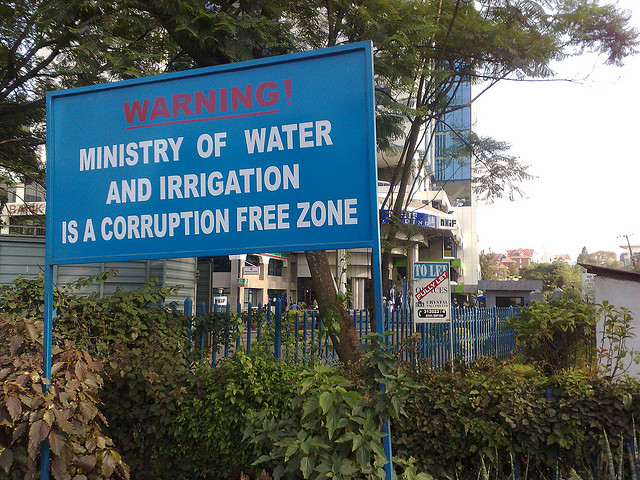"Save Kenya from the appetite for money"
July 23rd, 2014 Kenya’s government has promised to reform the public service sector, but Joshua Orawo, 24, a Correspondent from Kenya, argues that the attitudes of elected representatives also need reform if the public is to see any change.
Kenya’s government has promised to reform the public service sector, but Joshua Orawo, 24, a Correspondent from Kenya, argues that the attitudes of elected representatives also need reform if the public is to see any change.
I had to travel to Kisumu (my home county) a fortnight ago because I had a number of meetings to attend there. My first meeting was at Kisumu Hotel and only lasted half an hour. Because it was only 3.00 pm, and the other meetings would be taking place the following day, being the nationalist that I am, I decided to take a walk around the county offices to find out what was happening.
I went into the Prosperity House which houses the County Government, and nothing strangely stunning was going on. I would knock onto doors, open and exchange pleasantries with the occupants. At around 3.30 pm, a significant number of the desks were empty; it did not look like the occupants of the said desks were anywhere in the vicinity, maybe consulting in the next office or even answering to a call of nature: they had left for home. I asked for the whereabouts of the governor at his secretary’s office and was told that he was away on a trip.
As I left the Prosperity House, I said to myself that nothing had changed in the way government offices were handled. The same practices I had seen in government offices as a high school student were pretty much the same as what was taking place now, even under the new county administration – people reporting to work as late as 10.00 am and leaving as early as 3.00 pm, ideally coming back to pick their bags after a lengthy lunch and leave for home. There were cases of serving members of public with an attitude, asking for bribes from members of public for expedited services to mention the least. That, I thought, was heartbreaking given the nature of reforms that has been directed to the public service sector over the years, but aren’t the very same people who served under the old rotten system still serving under the devolved system?
Why would we even expect them to change anyway? These workers, like any Kenyan public servant, understand the government they work for. They know that the government too often seem involved more in rhetoric than action. They suspect that the government says it is reforming the public service sector for cameras and public relations, and that it promises to crack the whip on corrupt public officers during the day and promotes the leading goon by night. These officers are indeed devout students of their teachers.
My next stop was at the Kisumu County Assembly, and I had really not intended to stop here. As I walked past the gate to the County Assembly hall, my attention was drawn to the big cars that graced the car park. Because I know quite a number of the members of the county assembly (MCAs), and the lifestyles they had prior to their election/nomination to the assembly, I had to stop and ascertain that it was not what I was thinking. So I went into the County Assembly compound and signalled one of the security officers. When he had come, I asked him whose cars those were, just in case some people within town were using the otherwise idle assembly parking. I was tragically wrong; the four-wheel drive cars parked at the county assembly belonged to our esteemed representatives in the assembly.
This brings me to my question: are the MCAs out to milk the public coffers clean?
What exactly is the motive behind the illogical demands by the MCAs? Are Kenyans paying for electing predominantly illiterate people to the said office? Let us try placing things in context. The MCAs have been in the limelight for all the wrong reasons – using ‘public’s money’ to fund trips abroad in the name of ‘exchange programmes’, calling for increment of their pay, in fact suggesting that they ought to earn an amount higher than the governors because they cannot oversee a person whose pay is higher than their own, demanding to be provided with cars and two body-guards per MCA, the list is endless.
A striking phenomenon is their power-drunken attitude, particularly towards governors. Increasingly, governors in Kenya today dread the MCAs, because it is not clear when they might strike against them (the governors). They seemingly hold the governors at ransom, threatening to impeach them if they fail to dance to their tune. But their melody is both depressing and poor, who wants to dance to such tune?
Kenya’s strongbox must be saved from the gastronomes in the name of MCAs, otherwise we are all headed for bad times ahead!
photo credit: Wayan Vota via photopin cc
…………………………………………………………………………………………………………………
About me: A community-mobilizer, youth activist and laws graduate, I am the Executive Director of Intreach Community, a civil society organisation involved in philanthropy for impoverished children and other under-served societal groups. I work towards all inclusive political leadership, where the youth, women and children can voice their concerns without fear and where equality and mutual respect thrive; and a society where fundamental human rights are revered.
…………………………………………………………………………………………………………………
Opinions expressed in this article are those of the author and do not necessarily represent the views of the Commonwealth Youth Programme. Articles are published in a spirit of dialogue, respect and understanding. If you disagree, why not submit a response?
To learn more about becoming a Commonwealth Correspondent please visit: http://www.yourcommonwealth.org/submit-articles/commonwealthcorrespondents/
…………………………………………………………………………………………………………………




